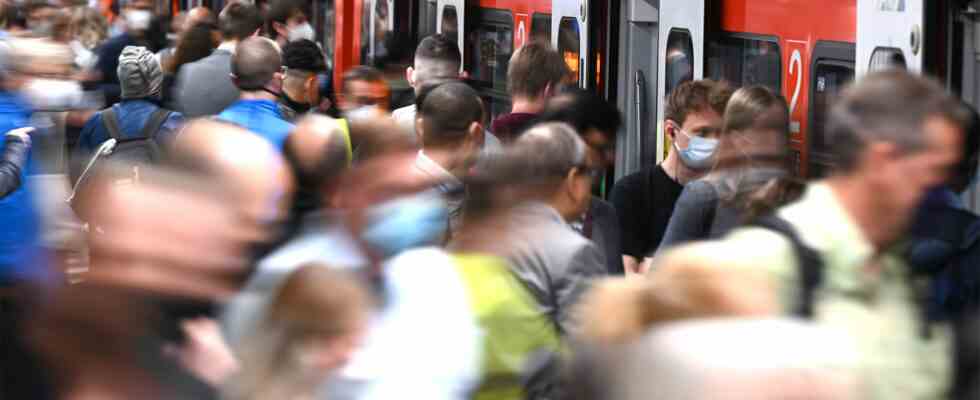Status: 10/14/2022 10:46 am
The 9-euro ticket had a slowing effect on the inflation rate in the summer. Economists doubt that this will also be the case with the successor model for 49 euros. Meanwhile, the German Association of Cities welcomes the agreement between the federal and state governments.
According to economists, the planned 49-euro ticket for local transport, unlike its cheaper predecessor for nine euros, does not have what it takes to keep inflation in check. Jens-Oliver Niklasch, economist at Landesbank Baden-Württemberg (LBBW), told Reuters: “It is not to be expected that the 49-euro ticket will slow down inflation. The chief economist at Berenberg Bank, Holger, has a similar view Schmieding: The inflation rate will be pushed down “only to a small extent”, “perhaps by 0.1 percentage points”.
The share of “passenger transport in local and long-distance traffic” and “passenger transport with buses and coaches” only make up a comparatively small proportion of the shopping basket used to calculate the inflation rate, said LBBW economist Niklasch. “In addition, long-distance rail transport and coach transport are not included in the 49-euro ticket,” says the economist. His conclusion is therefore: “Nice to have, but not a substantial brake”. The ticket is more of a funding measure for public transport, which makes sense for environmental reasons.
Successor model to the 9-euro ticket
The transport ministers of the federal and state governments agreed yesterday on a nationwide local transport ticket that should cost 49 euros. The 9-euro ticket, which was valid from June to August, in conjunction with the tank discount introduced at the same time, had the effect that the price increase was noticeably curbed, as the Federal Statistical Office found out.
In September, the relief in regional and local public transport was lifted again: As a result, the prices for train tickets in local transport increased by 82.5 percent and for combined passenger transport by as much as 175.3 percent compared to the previous month.
The abolition of the 9-euro ticket and fuel discount contributed to the fact that the inflation rate rose to 10.0 percent in September, the highest level since 1951. “This phasing out together means a good one and a half percentage points of inflation,” said the scientific director of the Institute for Macroeconomics and Business Cycle Research (IMK), which is close to the trade union, Sebastian Dullien. In August, the inflation rate was still 7.9 percent. Experts assume that consumer prices will rise even more sharply in the coming months.
Cities day welcomes basic agreement
The German Association of Cities welcomes the planned 49-euro ticket for local transport – but demands more money from the federal government for buses and trains. Managing Director Helmut Dedy told the dpa: “The ticket must not slow down important investments in local transport, for example because it is at the expense of basic financing or the expansion of offers. In many of our cities we want and need new, more environmentally friendly buses and trains, attractive stops and shorter cycle times.”
The federal government had promised to finance a follow-up ticket to the 9-euro ticket with 1.5 billion euros – if the federal states make at least the same amount available. However, the federal states are only willing to co-finance if there is an agreement on the so-called regionalization funds. With this money they order buses and trains.
Too little for the climate protection goals?
In Dedy’s opinion, the federal government’s commitment is not sufficient to achieve the climate protection goals required in the transport sector. However, the general manager signaled the support of the cities for a “climate ticket” and the necessary public transport financing. “With a nationwide public transport ticket, we can ensure that even more people use buses and trains and leave their cars at home.”
Now the Prime Ministers’ Conference is asked to agree on the financing issues. “Public transport has long been extremely underfunded,” said Dedy. “The costs of the energy crisis and rising personnel costs are a top priority for transport companies.” The federal government must therefore also increase its regionalization funds for 2022 by at least 1.7 billion euros and add 1.5 billion euros annually for expansion and modernization from 2023.

